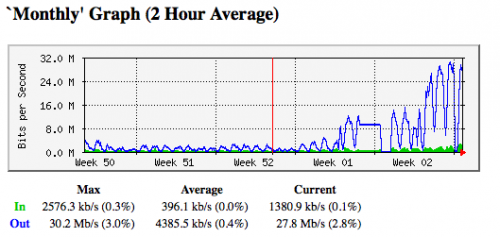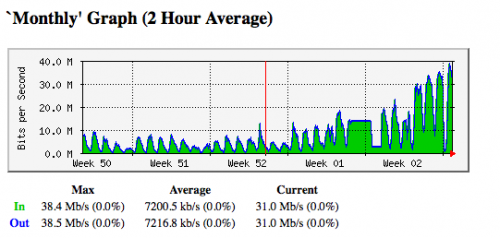The chart you’re looking at is amazing. Orange Uganda has seen local traffic jump from 3Mbs to over 30Mbs in just two weeks due to partnering and implementing Google’s Global Cache. One wonders how much business they’re starting to chip away at from their competition.
In layman’s terms this means that once anyone in Uganda using Orange has visited a website (especially Google’s data heavy ones like YouTube, Google Maps or even Search results), that the content is cached locally. Once that is done, the next person to visit that same site gets it served to them locally, which is much faster than having their traffic make the round trip from Uganda to Europe.
There are 8 peering ISPs in Uganda, and only one of them is using Google Global Cache. Yet, below we see that Orange Uganda has made the whole country’s usage start to look like a hockey stick.
This begs the question, “why aren’t the other 7 peers using Google’s Global Cache?”
It also makes you wonder why more ISPs haven’t started using this in other countries. After all, it gives your users a distinct advantage, they get a much better user experience than they did before.
From all that I’ve heard, it sounds like each ISP is more interested in keeping their competition away from the Google Global Cache than they are about their customer’s experience. This means that they refuse to sign a deal with Google unless they’re the only ones who can use it, blocking out their competitors.
Take a moment to ponder this idiocy with me. Right now we’re all on equally crappy load times for data-heavy content, all of the ISPs suck at relatively the same level. If they all moved to Google’s Global Cache, they would still all be at relatively the same level, but it wouldn’t suck. Sure, no advantage gained over the competition, but a lot less pain to their users.
Here’s the kicker… with faster data speeds and load times, people use more data. Their profits would increase.
This is a perfect example where a rising tide would float all boats, but all the captains have decided they like to wallow in the mud instead.
[Note: Thanks to Tim McGinnis for the tip]


January 17, 2011 at 4:27 pm
Uganda Telecom has a Google Global Cache too, it ain’t only orange Uganda!
January 17, 2011 at 4:35 pm
Actually, just checked and you’re right Richard. It appears that the deal is between Google and UTL, and that Orange UG has made a deal with UTL. One could assume that Orange pays UTL to deliver this from the UTL data centre to Orange’s port at the UIXP, but I can’t confirm that. Interestingly enough, the GGC is not at the UIXP itself, so the traffic comes from UTL to Orange’s network.
January 17, 2011 at 4:53 pm
True, that is true! And I believe your assumption about the UIXP is right from what I can see discussed on the UIXP mailing list. UTL is moving to allow other ISPs access it’s GGC through the UIXP.
January 18, 2011 at 5:51 am
Is there any local CDN providers in Kenya/Uganda? Few of the big boys (ie Facebook ) would have private ones around Afria.
Tt seems that Akamai partnered with Rackspace last week. Akami are said to have an edge in SA.
January 18, 2011 at 8:30 am
Just to clear up some assumptions. The cache is freely available to all 8 peers. I strongly suspect once the other ISP’s see this effect we will see them also join the cache. The switches will finally start to get a good work out.
Currently no CDNs exist in Uganda but I think Watch this space would be the phrase.
Looking forward to clocking 100Mbits!
Simon Vass
Acting Communication Director UIXP
January 18, 2011 at 12:18 pm
Good initiative indeed. To bad Yahoo is not following suit and more ISP use it. Would be nice if full size photo’s and Video’s could be cashed local like I do on Flickr.
January 19, 2011 at 4:32 am
@Hash, the GGC is available for all peers at the UIXP at no cost to the peers. This is the arrangement that Google made with UTL. All ISP’s in Uganda can connect to the GGC by requesting this from UTL and connecting via the UIXP at no extra cost.
January 19, 2011 at 4:38 am
To add one more clarification in case it is not clear by freely available I mean there are at present no fees for the peers to connect to the GGC.
Simon Vass
Acting Communication Director UIXP
January 19, 2011 at 6:47 am
I am keen to see other peers take advantagge of the awesome free service by Google. However, since it was installed many months ago, it seems that there is a commercial aspect that has prevented others from getting access. I am hoping that we can find out what the terms and conditions are for others to get this traffic via the UIXP, since it is not hosted at the UIXP itself, but rather inside utl’s network.
What is most interesting to me is that while this may be a case of “paid-peering”, I think it is highly unique in that the folk who get the higher amount of traffic in a paid-peering situation normally also get the revenue. In this case, the peers at UIXP want the traffic, so may end up paying for it, despite receiving more traffic than they send to their peer.
January 20, 2011 at 10:50 am
Hash, got an idea of what the GGC scenario is like with Kenyan ISP’s?
January 20, 2011 at 12:48 pm
I’m sorry to mix in technicalities here, but but I don’t know of a less intrusive method to inform you that your RSS feed has stopped working. The topic “Tackling Africa’s Classified Listings Space” is the latest I saw via the feed when it was still working.
January 24, 2011 at 2:53 am
Didn’t AccessKenya partner with GGC?
January 24, 2011 at 5:13 am
@bernie: AFAIK, AK does have a GGC, but they aren’t sharing it with their peers. As a result, there is a 2nd GGC for KE at KDN, which will be shared by all peers, once a high capacity link from KDN to KIXP is comissioned (this is supposed to be online very shortly).